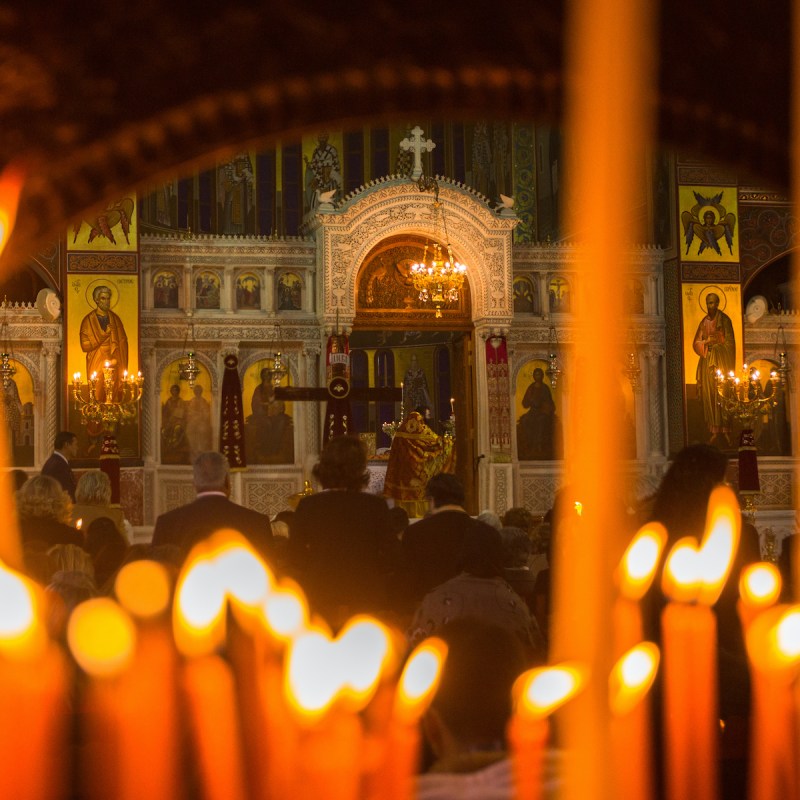
The biggest celebration on the Greek Orthodox calendar — bigger than Christmas — is Easter. In 2022, Greek Easter Sunday occurs between Friday, April 22, and Monday, April 25.
Videos by TravelAwaits
Eastern Christianity, and therefore Orthodox religion in many Balkan countries, follows a Julian calendar. It’s different from the Gregorian calendar followed by most other Christian countries — and their dates only occasionally coincide, the next time being in 2025.

What Is Greek Orthodox Easter?
Greeks consider it an honor to commemorate the fact Jesus died for their sins, hence there are weeks of fasting beforehand and, during Lent, a period of carnival; then over the Easter weekend, many church services, processions, and a whole host of gastronomical delights. You should be sure to pay a visit to Greece during this special time.
Where Is Greek Orthodox Easter Celebrated?
Naturally, the whole country celebrates this unique event, and with many Greek diasporas scattered around the globe, you’re bound to find Greeks celebrating from as far afield as Boston to Melbourne, a city which has the biggest Greek community outside of Athens — even more Greek people live there than in Greece’s second city of Thessaloniki.

How Is Greek Orthodox Easter Celebrated?
40 Days Of Lent
Lent starts 40 days before Greek Orthodox Easter and is a period of fasting; no meat products are eaten by the people who follow this practice. Bloodless fish is OK to eat, and a visit to any taverna at this time produces delicious calamari accompanied by Greek salad.
Lent starts on Tsiknopempti — “smoky Thursday” — when all meat products in the house are cooked into a delicious meal for one final round of gluttony before meat is not consumed for 40 days leading up to midnight on Easter Saturday. People will eat the famous taramasalata-fish roe dip, and anyone strictly observing this period also avoids meat byproducts, such as cheese, milk, and eggs. Don’t worry, if you’re a tourist in Greece, you’ll still find restaurants serving meat if you wish to eat it.
Apokries: Greek Carnival
Greek carnival period is a time of great merriment in the country. Forget Rio or Venice, Greece’s carnival is much more affordable and a chance for you to experience Greeks at their best. It’s celebrated over three weeks, 70 days before Easter, and during this period you’ll find many street parties, fancy dress, and floats — people celebrating the carnival’s deep pagan roots and dressing in traditional costumes of the provinces they belong to. Wandering the streets during this time, you’ll find locals throwing streamers and confetti, and a general all-round feeling of festiveness and merriment.
The biggest carnival of all takes place in the Peloponnese port town of Patras on the last weekend of the carnival period. People from all over Europe come to experience the dances, street parades, a treasure hunt, and children’s carnival, culminating at night with the ritual burning of the effigy of the Carnival King on St. Nicholas Pier.
The Red Egg
Pop into any Greek supermarket over the Easter period and you’ll find hard-boiled eggs in packaging, painted red. People usually dye their eggs at home on the Thursday before Good Friday, but in recent years, eggs have been pre-dyed for sale.
The Red Egg symbolizes the blood of Christ, the egg itself Christ’s sealed tomb. They’re also a symbol of fertility and eternal life. The Red Egg Game is played on Easter Saturday at midnight — effectively Easter Sunday. Families gather around the dinner table, one player holding the egg whilst another taps it with his own egg, the goal being to crack your opponent’s egg, effectively releasing Christ from his tomb. Kids love the game and find it very funny.

Easter Processions And Food
Good Friday is a particularly solemn day. You’ll hear chanting from the speakers of all churches, and in the evening, a wooden structure known as the Epitaphios is covered with many colorful flowers. At the end of the evening church service, there’s a street procession led by the Epitaphios and the priests. The public follows through the streets with thin, tapered lit candles, chanting psalms. It’s a beautiful sight.
Holy Saturday is a busy day, as at midnight, the breaking of the 40 day fast happens, hence households and restaurants are busy preparing a festive dinner.
A word of warning; be prepared to snack during the day because you won’t eat your meal until after midnight on Saturday, after the church service.
In Corfu at midday, the local tradition is for people to throw massive pots from their balconies onto the streets below, indicating a removal of the old to make way for the new. This tradition dates to Venetian times, as Corfu was a Venetian island for many years.

People all over the country gather in their local churches before midnight with white candles, lighting their flame from the priest’s — the Holy Light. At midnight, many fireworks are set off, as this is the Resurrection of Christ — a time for great celebration. Drums beat, people greet each other with the words “Christos anesti!” (“Christ is risen”), and once again, there’s a street procession with chanting of a much more upbeat nature.
Head to any restaurant after midnight, and make sure you have a strong stomach! After 40 days of fasting, the main menu item is magiritsa soup, made of herbs and lamb’s offal. Nothing goes to waste. The theory is this lines the stomach after so long without meat, ready for the huge meal to take place the following day.
Easter Sunday
Lamb is the meat that’s eaten all over Greece on Easter Sunday. Be prepared to see the whole animal roasting on the spit over charcoal in people’s gardens and outside tavernas. There’s festive music, people dancing in the streets, and in general, much merriment and joy, making it clear that Easter is a very important time in the Greek calendar.
If you’ve a chance to be in Greece at Easter, chances are you’ll be invited to someone’s home, such is the hospitality of these people. Many cities have their own regional festivities in the center and food in the public squares. Be sure to coincide your Greece visit with Easter time. You won’t regret it.
Related Reading:
